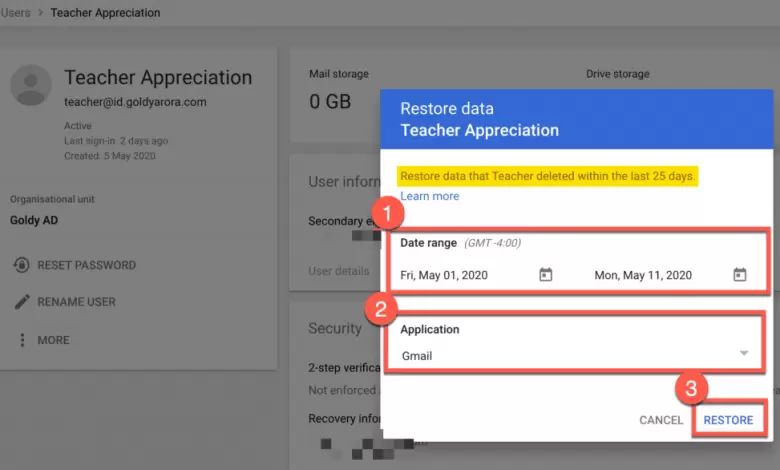How to Recover Deleted Emails from Gmail
Sometimes there are situations where you need to recover your deleted emails. You may have deleted your emails by mistake, or you never thought you would need them.
Well, now you may wonder if deleted Gmail emails can be recovered. The answer to this question depends on whether you use a Gmail account (Gmail.com@) or Google Workspace (Google Workspace). Are you a regular user or a Google Workspace administrator?
Let us examine all these conditions in detail and how they affect the possibility of recovering deleted Gmail emails.
Simple method
When you delete a Gmail, this email will automatically go to the Trash Bin and stay there for 30 days, so you will be able to recover them as follows:
The emails you routinely delete after 30 days are the same ones you manually or automatically deleted by Google from the Trash of your account.
To restore deleted Gmails within 30 days, go to the Trash Bin of your account (as shown below) and select the Gmail or Gmails you want to restore.
By default, the Gmails displayed on the first page are already selected; if you need to restore them, select all the conversations.
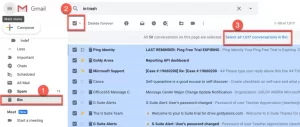
1- Click on the move to the icon.
2- Click on Inbox.
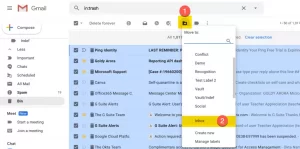
Gmail will ask you for confirmation about doing this, click OK, and now your Gmail will be moved from Trash Bin to Inbox.
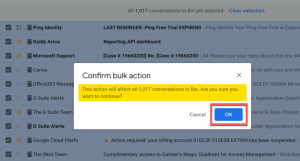
If you have a professional Google account (Admin account)
Using Google Workspace gives you more choices and flexibility to recover emails that the user routinely deletes.
First choice: Recover deleted Gmails through Google Workspace Admin Console, available in all applications.
Through the Google Workspace Admin Console, you can restore routine Gmails deleted by your users up to 25 days after deletion.
1- To use this option, log in to your Google Workspace Admin Console account and search for the intended users.
2- Enter the user details page.
3- Click on “ore.”
4- Click on “restore Data,” as shown below.
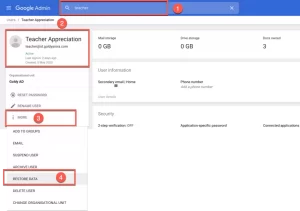
5- Enter the time frame of the desired Gmails for recovery (25 days).
6- Select the Gmail option from the Application list.
7- Click on Restore.
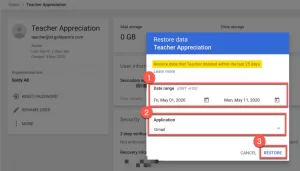
Second choice: recover deleted Gmails through the Security Investigation Tool available in the Google Workspace Enterprise application
The Google Workspace Enterprise program has a “security Investigation Tool “tool that you can use to perform the research you want and then perform related operations. Assuming that you are on the Google Workspace Enterprise plan, we will check the deleted Gmails and restore them to the uuser’smailbox.
Tip:
– The Security investigation tool recovers emails that the user routinely deletes within 30 days after they are deleted.
– To work with the Security investigation tool, you need access permission.
To start the search process, log in to your Google Workspace Admin Console account and go to the Investigation tool section under the Security settings option.
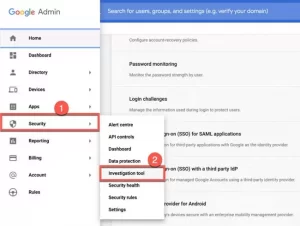
The details:
- Select “mail messages “at the top.
- Use AND to specify the desired condition.
- Specify the time range of emails you want to restore.
- Specify the rrecipient’sGmail.
- Select “elected” from the Label section. (Deleted refers to those Gmails that have been routinely deleted.)
- Click on Search.
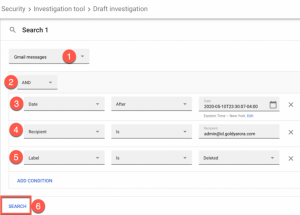
Now you can see all the emails the user deleted in the selected period.
1- Select the Gmail or Gmail you want to recover.
2- Click on the ACTIONS menu, as shown in the image below.

Click the “restore Messages “option.

You will be asked to confirm the X number of emails you want to retrieve for this user.
Click on “restore.”
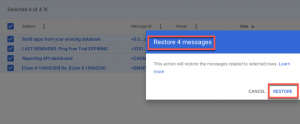
The process of recovering your emails will start now (while you can use the Abort option to stop this process wherever necessary.)

And now, the Security investigation tool will display the results you want, and if everything is done correctly, you will see the message “essage/s was restored successfully.”
Important points:
1- The recovered emails will be moved to the uuser’sTrash Bin and will not enter the Inbox because the Trash Bin is where the routinely deleted emails used to be.
2- You must be asking why we don’t transfer directly to the uuser’sinbo.? It is a good question because it is impossible; if you try to do this, you will encounter an error.
After moving the recovered Gmails to the uuser’sGmail Trash Bin, we can ask the user if they want to recover them from the Bin or do another search (this time in the Trash Bin), and then the Gmails transfer to the uuser’sinbox.

To transfer emails recovered from Gmail Trash Bin to Inbox, we need to do another research similar to the previous research (with the difference in its Label Name option).
This time, the Label Name should be on “in, “and our operation will be as shown in the image below, selecting the “end to Inbox “option.
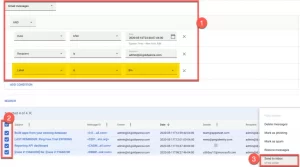
By clicking on “END TO INBOX, “you will confirm the group transfer of Gmails.

The process of transferring emails to Inbox will now begin.

Congratulations! The recovered emails are now available in the uuser’sGmail Inbox.

Third choice: Recover Gmails with Google Vault
Available on Google Workspace Business and Google Enterprise Business platforms (and as an extension in Google Workspace basic)
The Google Vault application is an archive-maintenance application that allows you to save your Google Workspace data according to your defined rules.
Let’s say you set a set of storage rules for your data. (Note: Although Vault starts working after you configure or create/change storage rules, its functionality is only effective for data that has not yet been deleted.)
Sign in to your account at ediscovery.google.com, create a Matter, and then search to find the emails you want to recover.
In the following example, I will recover a user’s deleted emails between May 1, 2020, and May 11, 2020 (with the keyword label^deleted).
After specifying the search conditions, click on Search.
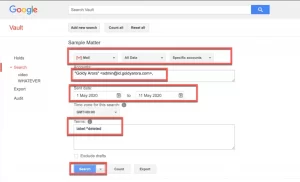
Now you will see the deleted Gmails based on Google Vault search terms.
Click on “export results “to extract this information.
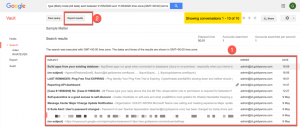
Now Google Vault will start extracting your information, and depending on the volume of selected data, the duration of the operation will vary.
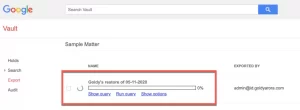
1- Define a name for the output file.
2- Select the geographic region of the data (e.g., none, US, Europe); this region is where the output file will be stored and available for up to 15 days.
3- Select the desired format (for example, Mbox or PST for Gmails); I chose this format due to the ease of the PST sending process compared to Mbox.
4- Click on Start Export.
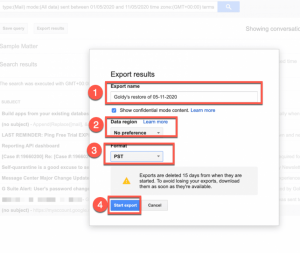
Click on “new X completed files “to see the results of the extraction operation.

Your Mbox file is saved in .zip format; click Download to save it to your system.
Note: According to the amount of information, the number of zip files will vary; for PST format, each zip file stores up to 1 GB of data.

common questions
1- Is it possible to recover routinely deleted emails in a Gmail account?
no
When you delete a Gmail, that Gmail goes into the Trash Bin and stays there for 30 days.
So if you routinely delete them from the Trash Bin or Google automatically deletes them after 30 days, Gmail recovery will not be possible.
2- How long are deleted emails available in GOOGLE VAULT?
It depends on your set retention period in Google Vault.
For example, if you use the term “unlimited” in the definition of storage rules, your data will be accessible as long as you are a Google Vault user.
3- Is it possible to recover Gmail after registering in GOOGLE VAULT?
It depends.
If 25 days have passed since the Gmails were deleted, or the user does not have a Google Vault account or has not yet made the relevant settings, he will not be able to recover the Gmails, even if he registers in Google Vault (or makes its settings).
4- Why can’t I see deleted emails in SECURITY INVESTIGATION TOOL?
According to GGoogle’sdefinitions, it takes up to 60 minutes to enter Gmail logs in the Security investigation tool.
Therefore, displaying deleted emails for up to 60 minutes is impossible. If you are facing this problem, try again in an hour.
5- Should I be SUPER ADMIN to recover deleted Gmails from GOOGLE VAULT or SECURITY INVESTIGATION TOOL?
No, both Google Vault and Security Investigation tool provides the possibility to benefit from admin access permissions; as long as you have this possibility, you can use the mentioned tools to recover deleted Gmails.
